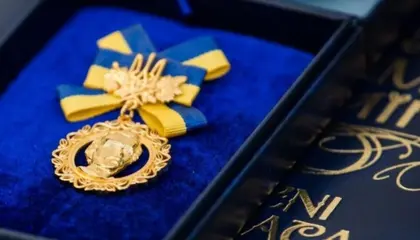Since Soviet times, there has been one immovable tradition in Ukrainian cultural life. The period leading up to March 9 is one of high tension because on that day – the birthday of Ukraine’s national poet, Taras Shevchenko – the winners of the National Arts and Literature Prize named after him are announced.
According to the rules of this state prize, the selection committee puts forward a list of laureates which is confirmed in a decree signed, until 1991, by the secretary of the Communist Party of Ukraine, and after that by the president of Ukraine.
JOIN US ON TELEGRAM
Follow our coverage of the war on the @Kyivpost_official.
For 60 years, without interruption, March 9 was when the winners of the national awards for achievements in the arts and literature were announced. This year on the morning of March 9, despite the usual tense expectations of the country’s cultural elite, no presidential decree was forthcoming. Instead, the chairman of the Shevchenko Prize selection committee, Yuri Makarov, posted that the wartime environment justified changes to the rules of the prize. He also admitted that other members of the committee had not agreed with him.
The Shevchenko Prize committee met to make its final decisions in February. Since then, the list of laureates has been with the President’s Administration, awaiting a signature. On March 9, when it became obvious that the president was not going to sign the committee’s list, the committee took the unprecedented step of publishing their decision without the presidential decree.

Drone Wars –Technology, Tactics, Strategy, Countermeasures, Legislation
The winners, are, in my view, worthy representatives of Ukrainian culture and literature. Among them is Iryna Tsilyk, the author of the documentary film “The Earth Is as Blue as an Orange,” for which she has already received many international awards, Kateryna Kalytko, a well-known poet and translator of Balkan literature, the musical ensemble Chorea Kozatska (Cossack Choir) which keeps alive ancient Ukrainian singing and instrumental traditions under the leadership of the legendary musician and music historian Taras Kompanichenko, and Vitaly Portnikov – one of the country’s brightest essayists and journalists.
Instead of confirming the Committee’s decision, on March 9 President Volodymyr Zelensky called together cultural figures for a meeting during which he spoke at length about the need to create new “content” that would correspond to Ukraine’s wartime situation and which would constitute an important contribution to the victory over Putin’s army.
It has been a long time since Ukraine saw such mass indignation among artists, film directors, writers and theater people! Social networks were boiling over with outrage. A dozen conspiracy theories were suggested about how the president’s administration intended to push forward their candidates for the award. Another version was that for the office of the president, the journalist Vitaly Portnikov was unacceptable as a laureate. Portnikov often criticizes Zelensky’s administration while he is much less critical of the previous president, Petro Poroshenko.
At the meeting with the President, Makarov suggested that the announcement of all laureates could be postponed until May 22 – the day when Shevchenko’s remains were buried at Kaniv, in the Cherkassy region. Makarov suggested that before that date, some new nominations could be considered which were relevant to Ukraine’s wartime situation.
One of the selection committee members, the artist Vlada Ralko, resigned on March 9. Numerous explanations were rumored as to why. Certainly, she had already served three years, the usual term for committee members; but it is also true that no prize was awarded for fine art this year. Then another committee member resigned, and on the third day of the scandal, with no resolution in sight, the chairman himself, Yuri Makarov, resigned.
The problem remains that, according to the rules of the award, the laureates must be announced in a presidential decree. While no degree has been signed, it is premature to congratulate anyone.
The now decapitated Shevchenko Prize Committee has fallen silent and there is still no confirmation that there will be some kind of ceremony with the announcement of laureates on May 22 and certainly no confirmation from the president’s administration that the winners will be those who were selected by the committee.
What surprises me most of all is that there is now more heated discussion about the Shevchenko Prize on social networks than news from Bakhmut and other hot spots along the front. I imagine that many of the commentators appreciate the incongruity of the situation. We should all be focused on supporting our armed forces. However, it is also true that Ukrainian intellectuals do have a responsibility to defend traditions that strengthen Ukrainian culture.
On the one hand, the country is trying to live as if the war cannot get in the way of life: awards are given out, films and plays are premiered, restaurants and cafes open. This is also a kind of resistance to Russian aggression. On the other hand, it is very hard to understand how it was possible to lead the Shevchenko Prize to this dead end – creating such a scandal on the very day that we should have been marking Taras Shevchenko’s birthday.
Now that 13 of the 18 members of the Shevchenko Prize Committee have resigned, it can be said that, most likely, the national award ceremony will not take place. The chances of signing a presidential decree on this year's award winners are also close to zero. Objectively speaking, the Taras Shevchenko National Prize has become another victim of Russian aggression and Ukrainian management during the war. On the other hand, the list of laureates in 2023 was generally received with enthusiasm by the Ukrainian society, despite the fact that the legitimacy of this list is now in big question.
The views expressed in this opinion article are the author’s and not necessarily those of Kyiv Post.
You can also highlight the text and press Ctrl + Enter






